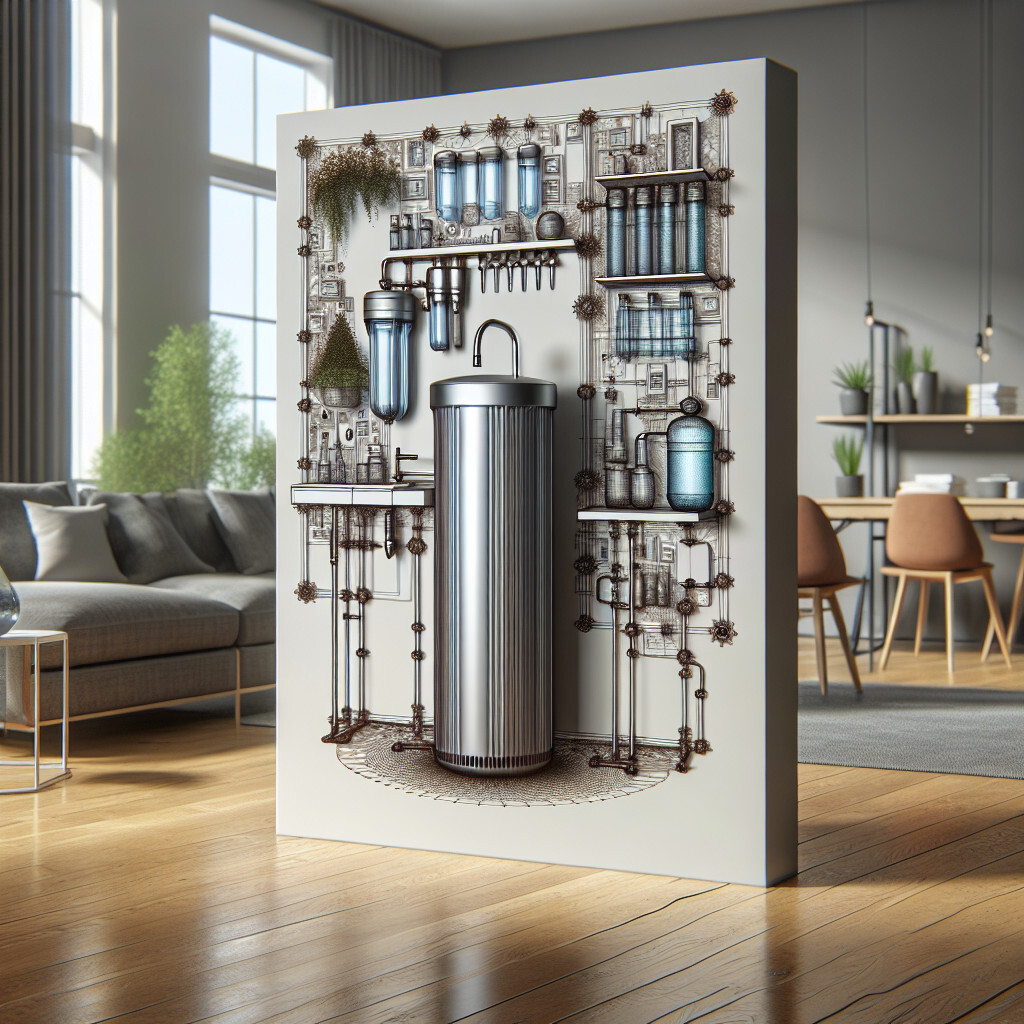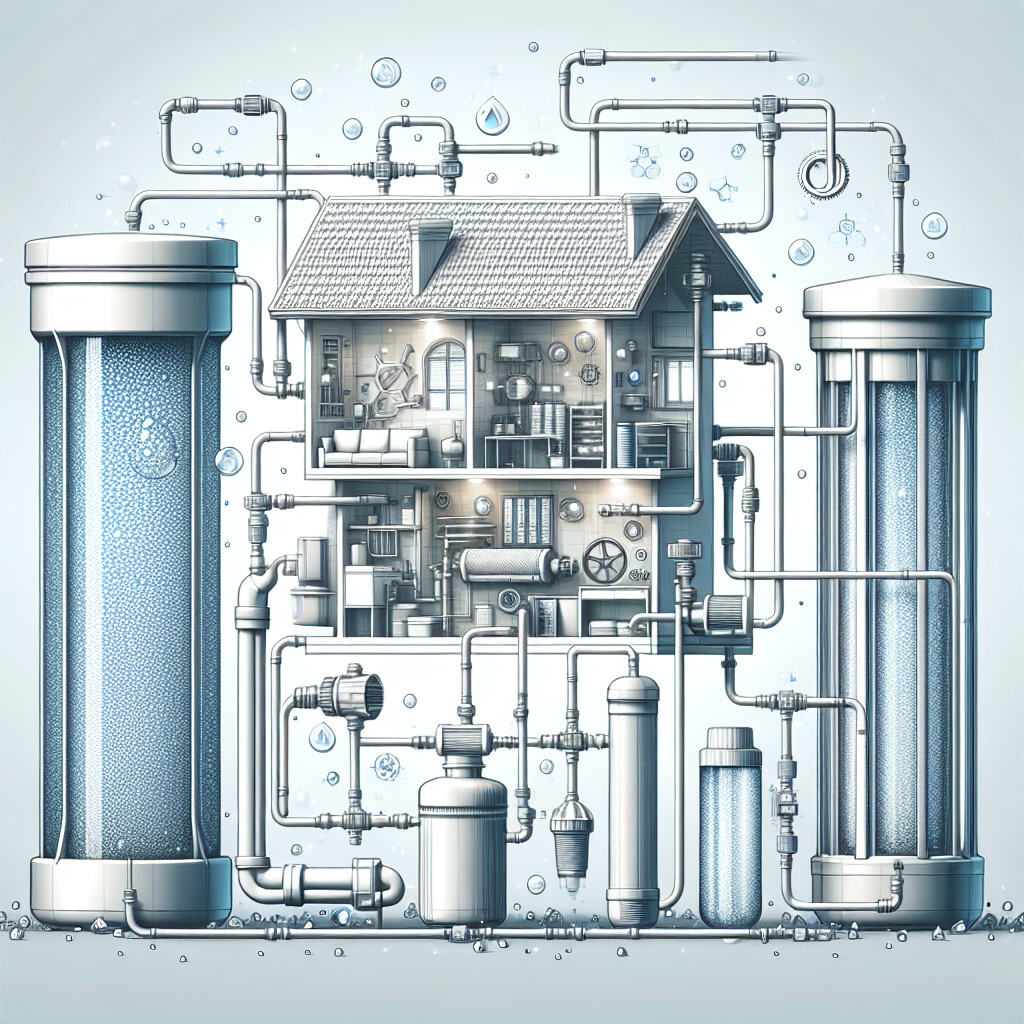-
Table of Contents
- Introduction
- Understanding the Tax Deductibility of Home Water Filtration Systems
- Exploring Tax Benefits: Is Your Home Water Filtration System Deductible?
- The Connection Between Home Water Filtration Systems and Tax Deductions
- Decoding Tax Deductions: The Case of Home Water Filtration Systems
- Q&A
- Conclusion
“Enhancing Water Quality, Not Your Tax Deductions: Home Water Filtration Systems.”
Introduction

A home water filtration system is typically considered a home improvement, enhancing the quality of water in your residence. However, it is not generally tax deductible under standard U.S. tax laws. While certain energy-efficient home improvements can qualify for tax credits, water filtration systems usually do not fall under this category. It’s always recommended to consult with a tax professional for advice tailored to your specific circumstances.
Understanding the Tax Deductibility of Home Water Filtration Systems
Understanding the tax deductibility of home water filtration systems is a topic that has garnered interest among homeowners. As more people become aware of the importance of clean, safe drinking water, the installation of home water filtration systems has become increasingly common. However, the question that often arises is whether the cost of these systems is tax deductible.
To answer this question, it is essential to understand the Internal Revenue Service (IRS) guidelines on tax deductions. According to the IRS, only expenses that are considered necessary for medical care, including diagnosis, cure, mitigation, treatment, or prevention of disease, and the costs for treatments affecting any part or function of the body, are tax deductible. Therefore, if a home water filtration system is installed for medical reasons, such as to alleviate a specific health condition that is exacerbated by unfiltered water, it may be considered a tax-deductible medical expense.
However, the IRS also stipulates that the medical expense deduction is only available to taxpayers who itemize their deductions, and the total medical expenses must exceed 7.5% of the taxpayer’s adjusted gross income. This means that even if the water filtration system is installed for medical reasons, the cost may not be deductible if the taxpayer does not itemize deductions or if the total medical expenses do not exceed the threshold.
Furthermore, it is important to note that the cost of a home water filtration system may not be fully deductible even if it qualifies as a medical expense. The IRS allows a deduction only for the amount by which the cost of the system exceeds the increase in the value of the home due to the installation of the system. This means that if the installation of the water filtration system increases the value of the home, the deductible amount may be reduced.
On the other hand, if the water filtration system is installed for non-medical reasons, such as to improve the taste of the water or to reduce the hardness of the water, the cost is not tax deductible. The IRS considers these improvements as personal living or family expenses, which are not eligible for tax deductions.
In conclusion, while the installation of a home water filtration system can provide numerous health and lifestyle benefits, its cost is not generally tax deductible. However, in certain circumstances where the system is installed for medical reasons and other IRS criteria are met, a portion of the cost may be deductible. As tax laws are complex and subject to change, it is always advisable to consult with a tax professional or the IRS directly for the most accurate and up-to-date information.
Exploring Tax Benefits: Is Your Home Water Filtration System Deductible?
As we delve into the realm of tax benefits, one question that often arises is whether a home water filtration system is tax deductible. This is a pertinent question, especially for homeowners who have invested in such systems to ensure the purity of their drinking water. The answer, however, is not as straightforward as one might hope.
To begin with, it is important to understand the general principles of tax deductions. The Internal Revenue Service (IRS) allows taxpayers to deduct certain expenses from their taxable income, thereby reducing their overall tax liability. These deductions typically include costs related to home ownership, such as mortgage interest, property taxes, and certain home improvements. However, not all home-related expenses qualify for a tax deduction.
When it comes to home water filtration systems, the IRS does not explicitly list them as a deductible expense. This means that, in most cases, the cost of purchasing and installing a water filtration system cannot be directly deducted from your taxable income. However, this does not necessarily mean that there are no tax benefits associated with such systems.
One potential avenue for tax benefits is through the medical expense deduction. The IRS allows taxpayers to deduct certain medical expenses that exceed 7.5% of their adjusted gross income. If a water filtration system is installed for medical reasons – for instance, if a household member has a health condition that requires purified water – it may qualify as a deductible medical expense. However, this would require a recommendation from a medical professional and substantial documentation to substantiate the claim.
Another potential avenue for tax benefits is through home improvement deductions. If the installation of a water filtration system is part of a larger home improvement project that increases the value of your home, it may be possible to deduct some of the costs associated with the project. However, this would typically require an appraisal to determine the increase in home value, and the deduction would be limited to the amount by which the improvement increases the value of the home.
It is also worth noting that tax laws vary by state, and some states may offer additional tax incentives for homeowners who install water filtration systems. For instance, some states offer tax credits or rebates for homeowners who install energy-efficient appliances, which may include certain types of water filtration systems.
In conclusion, while the cost of a home water filtration system is not typically tax deductible, there may be certain circumstances under which tax benefits can be obtained. These include medical necessity and home improvement deductions, as well as state-specific tax incentives. As always, it is recommended to consult with a tax professional to understand the potential tax implications of any major home purchase or improvement.
The Connection Between Home Water Filtration Systems and Tax Deductions
The connection between home water filtration systems and tax deductions is a topic that has been gaining attention in recent years. As more homeowners become aware of the health and environmental benefits of using filtered water, the question arises: Is a home water filtration system tax deductible? The answer to this question is not straightforward and depends on several factors, including the type of filtration system, the purpose of its installation, and the specific tax laws in your country or state.
In general, home improvements that increase the value of your property or prolong its useful life are considered capital improvements and are not tax-deductible. This includes most types of water filtration systems. However, there are certain exceptions to this rule. For instance, if the filtration system is considered a medical necessity, it may qualify for a tax deduction. This is because the Internal Revenue Service (IRS) allows taxpayers to deduct medical expenses that exceed a certain percentage of their adjusted gross income. If your doctor recommends installing a water filtration system due to a specific health condition, you may be able to deduct the cost of the system and its installation.
Another potential avenue for tax deductions is if the filtration system is part of a home-based business. If you use filtered water for business purposes, such as operating a home-based daycare or a bed and breakfast, you may be able to deduct a portion of the cost as a business expense. However, the IRS has strict rules about what constitutes a home office or business, so it’s important to consult with a tax professional before claiming this deduction.
In addition to these federal tax considerations, some states offer tax incentives for homeowners who install water filtration systems. These incentives can take the form of tax credits, rebates, or deductions, and they are typically designed to encourage water conservation and the use of environmentally friendly technologies. The specifics of these programs vary by state, so it’s worth checking with your state’s department of revenue or a local tax professional to see if you qualify.
While the potential for tax deductions can make a home water filtration system more affordable, it’s important to remember that the primary benefits of these systems are improved water quality and health. Filtered water is free of contaminants like lead, chlorine, and bacteria, which can have serious health effects. Moreover, by reducing your reliance on bottled water, a home filtration system can help you reduce your environmental footprint.
In conclusion, while a home water filtration system may not be tax deductible in most cases, there are certain situations where you may be able to claim a deduction. These include when the system is a medical necessity or part of a home-based business, or when state tax incentives are available. Regardless of the tax implications, investing in a water filtration system can provide significant health and environmental benefits. As always, it’s recommended to consult with a tax professional to understand the potential tax implications of any home improvement project.
Decoding Tax Deductions: The Case of Home Water Filtration Systems
Decoding tax deductions can be a complex task, especially when it comes to home improvements. One question that often arises is whether a home water filtration system is tax deductible. The answer, unfortunately, is not as straightforward as one might hope. It largely depends on the specific circumstances surrounding the installation of the system and the tax laws in your particular jurisdiction.
In general, the Internal Revenue Service (IRS) does not consider home improvements, such as the installation of a water filtration system, to be tax deductible. This is because these improvements are seen as adding value to your home and extending its useful life, rather than being necessary expenses. However, there are certain exceptions to this rule that may apply in specific situations.
For instance, if the water filtration system is installed as a medical necessity, it may be tax deductible. The IRS allows deductions for medical expenses that are necessary for the diagnosis, cure, mitigation, treatment, or prevention of disease. If your doctor recommends installing a water filtration system for health reasons, such as to alleviate a specific medical condition or to ensure a clean water supply due to a compromised immune system, you may be able to deduct the cost of the system.
In such cases, it is crucial to have a written statement from your doctor outlining the medical necessity of the water filtration system. Additionally, the cost of the system must also exceed 7.5% of your adjusted gross income to qualify for a deduction. It’s important to note that only the amount that exceeds this threshold is deductible.
Another potential avenue for tax deductions is if the water filtration system is considered a necessary part of your business. If you run a business from your home and the water filtration system is necessary for your business operations, you may be able to deduct it as a business expense. However, the system must be used exclusively for your business to qualify for this deduction.
Furthermore, some states offer tax incentives or rebates for homeowners who install water filtration systems or other energy-efficient appliances. These incentives are designed to encourage homeowners to make environmentally friendly improvements to their homes. If you live in a state that offers such incentives, you may be able to recoup some of the cost of your water filtration system through a tax credit or rebate.
In conclusion, while a home water filtration system is not typically tax deductible, there are specific circumstances where it may be. If the system is installed for medical reasons or as a necessary part of a home business, you may be able to deduct the cost. Additionally, some states offer tax incentives for installing such systems. As always, it’s recommended to consult with a tax professional to understand the potential tax implications of installing a home water filtration system. They can provide guidance based on your specific situation and the tax laws in your jurisdiction.
Q&A
1. Question: Is a home water filtration system tax deductible?
Answer: No, a home water filtration system is typically not tax deductible.
2. Question: Can I claim a home water filtration system on my tax return?
Answer: Generally, you cannot claim a home water filtration system on your tax return as it is considered a personal expense.
3. Question: Are there any exceptions where a home water filtration system could be tax deductible?
Answer: Yes, if the water filtration system is a necessary medical expense prescribed by a doctor for a specific health condition, it may be tax deductible.
4. Question: Can I deduct the cost of installing a home water filtration system?
Answer: No, the cost of installing a home water filtration system is not tax deductible as it is considered a home improvement expense.
Conclusion
A home water filtration system is not tax deductible as it is considered a personal expense and not directly related to medical needs or a home business.






